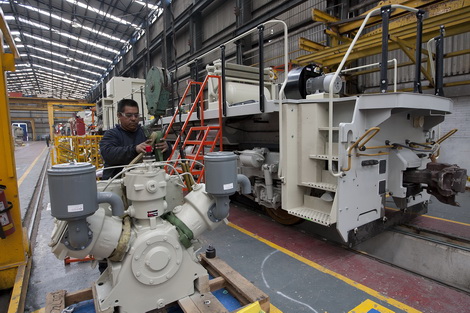Bombardier plans growth
Updated: 2011-08-31 09:27
By Wang Wen (China Daily)
|
|||||||||||
| ?
 An employee works at the Bombardier Inc assembly plant in Sahagun, Mexico. The world's largest train maker is looking for new growth in China.[Photo/Bloomberg] |
Suspension of high-speed rail work won't stop firm's expansion efforts
BEIJING - The suspension of new high-speed rail (HSR) projects in China has sent the Canadian train maker Bombardier Inc in search of new growth drivers in the country.
Light-rail systems, commuter trains and automated people movers are areas in which the company aims to expand, Zhang Jianwei, president of Bombardier China, said on Monday.
"We will continue to expand our business in China and we cannot miss opportunities here," Zhang said. The vehicle maker has three joint-venture companies that manufacture rail equipment in the country.
Zhang said there is a huge market for these new businesses, as at least 15 cities plan to build light-rail systems.
According to the Development Research Center of China's State Council, cities including Beijing, Chongqing, and Dalian are building light-rail services and by 2020 the combined length of the network will total 2,000 kilometers.
China's first intercity light railway, between Guangzhou and Foshan in Guangdong province, opened in November 2010.
Commuter trains, which connect city centers to the outlying suburbs and dormitory towns, are uncommon in China, but systems are planned for Shanghai, Nanjing in Jiangsu province and the municipality of Tianjin, to ease congestion on the roads.
An executive meeting of the State Council on Aug 10, presided over by Premier Wen Jiabao, announced a reduction in the operating speeds of bullet trains and the suspension of approvals for new projects. That move was prompted by a fatal rail crash near Wenzhou in Zhejiang province on July 23 in which 40 people were killed and nearly 200 were injured.
Manufacturers of rail transportation equipment will have to lower their profit expectations, because of the slowdown in the construction of HSRs and demand for equipment will also be affected, analysts said.
Wang Liang, a transportation equipment industry analyst at Yingda Securities Co Ltd, said the government's policy will have an adverse effect on manufacturers.
"Because of the suspension, new orders will be rare in the short term," Wang said.
Purchases of bullet trains will be postponed in the second half of 2011, even though the accident, which was thought to be the result of a faulty signal system, was not directly related to train manufacturers, according to an unnamed manager with an enterprise owned by the central government who was quoted by the 21st Century Business Herald newspaper recently.
However, business insiders are still optimistic about the future of China's HSR network, because the country needs the system to aid its rapidly developing economy.
Wang said the HSR network could enter a period of moderate growth, despite the accident in July, because the country's modernization requires high-speed railways.
Zhang said he believes that the suspension is a temporary measure.
"The high-speed rail network will certainly continue to develop in China," he said.
Bombardier still has sufficient orders at present, Zhang said.
The company signed a $4 billion contract with the Ministry of Railways in 2009 for 80 high-speed trains with a maximum operating speed of 380 kilometers an hour. Deliveries are expected to begin next year.
"We have already had 15 new orders in 2011 and I expect five more before the end of the year," Zhang said.
Those orders are mainly for signaling and propulsion equipment for both HSRs and subways, he added.
Bombardier entered the Chinese market in 1999 and has already supplied more than 1,000 railway passenger cars to the Ministry of Railways, including high-altitude passenger cars for the Qinghai-Tibet railway.













